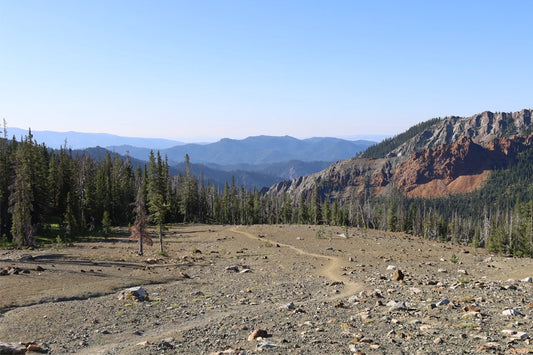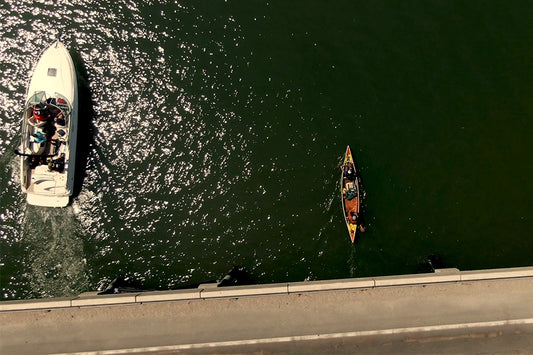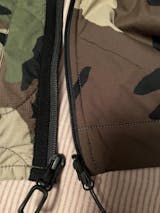What is a Vehicle EDC Kit?
EDC (everyday carry) is a term for essential items, or tools that you carry on your person to assist you with daily tasks. Essentially your vehicle EDC kit should consist of tools and supplies that augment your personal EDC items. These are items that will come in handy during a roadtrip, a roadside emergency, or potentially a survival situation.
Things to Consider
The amount of time you spend in your car, where you drive, and driving conditions will dictate the contents of your vehicle EDC kit.
Personally, I fall into the weekend warrior category. I commute 45 minutes each way to my 9-5 during the week and I head straight for the mountains on the weekends. My main outdoor activity is whitewater kayaking and as a paddler in the Pacific Northwest, it’s not uncommon for me to log 300-400 miles over the course of a weekend (year round). Most of the excellent river access that we have in Washington/Oregon/Idaho is via Forest Service roads. These dirt roads are often roughly maintained and can cover a pretty significant amount of elevation. No matter the season, I’ll likely encounter mud, rain, and snow during the course of a weekend outing.

Vehicle EDC Gear:
Storage
- Plastic Containers – If you have a truck, or a larger SUV, a good solution for organizing your kit may be flat plastic containers. Plastic containers are a cheap way to keep your kit organized and easy to access. They’ll also protect your carpets from wet gear.
- Rooftop storage box – If you have a smaller car, or you just want more space, you might consider a rooftop storage box. I store the majority of my gear in a yakima box on top of my Subaru. This gives me enough room in the trunk to put the seats down to sleep without the need to rearrange all of my gear.
Navigation / Communication
- Phone – A phone is going to be your first lifeline in case of an emergency. If you find yourself running out of battery, switching into airplane / power saver mode will help save battery.
- Car Charger
- Extra Power Bank – A fully charged USB power bank can be a godsend if your car completely dies on you.
- Road Map – In today’s society, we rely heavily on our mobile devices. They can be incredible tools and should be an essential part of your vehicle EDC kit. That said, google maps doesn’t always work and often the most beautiful, remote places lack cell service. In addition to your phone, you should also have a road map for backup… and you should know how to read it.
- Compass
Food and Water
- Bottled Water – For general hydration, I keep a jug of water in either the front seat, or the backseat for quick access. I also keep about a half box of bottled water in my roofbox for emergencies.
- Water Filter – I have a Sawyer Water filter that I keep as a backup. Super compact and relatively inexpensive.
- Stainless Steel Water Bottle, or Nalgene
- Box of Bars – Bars are nice because they are usually a compact source of necessary nutrients (Brand Dependent – Read the label!) and they usually taste like shit, so you won’t be constantly breaking into them when you’re hungry on the road.
- Bags of Mountain House – Mountain House is great because it’s lightweight and it only takes a cup of boiling water to make. I’ll usually only pack this when I’m headed out on a trip. It’s nice to have a warm meal after a cold day on the river. Also, during the summer months, you don’t have to worry about it going bad in the heat.
- Biolite Stove – The Biolite runs on natural fuel like small branches and leaves. It also has USB port, so you can charge your phone in a pinch. It’s a nice alternative to a backpacking stove because you don’t have to carry around extra canisters. That said, It can be a little tricky to use, so make some time to practice with it.
- Spork

Vehicle Maintenance / Roadside Emergency
- Jumper Cables
- Socket Set / Basic Tools
- Gorilla Tape – Aside from fixing everything, duct tape, or Gorilla tape can also be sliced and used as tinder.
- Fluids (as necessary) – This is sort of vehicle dependent. My Subaru tends to burn through oil and coolant, so I try to keep an extra bottle of each.
- Tire Plug Repair Kit – Auto repair shops are often few and far between when you’re out in the sticks. In addition to your spare, I would invest in an On-Rim tire repair kit with a portable tire inflator. This is especially handy if you get more than one flat tire.
- Gas Can
- Road Flares
- Gloves – A good set of work gloves will go a long way for winter repairs.
- Tow Strap

Survival / Safety
- First Aid Kit – I keep a small backpacking first aid kit for general care. It’s important to try to re-inventory your kit after every use, so you’re not caught without supplies.
- Headlamps x 2 – Far superior than a flashlight for just about every task. That said, they’re small and easy to lose, so pack extras.
- Fire Kit – My fire kit consists of 3 bic lighters, waterproof matches, vaseline dipped cotton balls (stuffed in a pill bottle), and some store bought tinder.
-
Duraflame Log – This one may seem kind of odd, but I’ve had a duraflame log burn for 3 hours in a torrential downpour… pretty clutch after a long day of paddling. Note: Duraflame logs don’t burn down into coals, so if you’re planning on cooking, gather some firewood to use in conjunction with the duraflame.
- Folding Saw – I have a silky BIGBOY 2000 that I keep in my car at all times. I can use the folding saw for cutting firewood and clearing the roadway of small downed logs and branches.
- Fixed Blade Knife – A good fixed blade is going to be one of the most useful tools in your kit. You can use it to cut rope, make tools, and process firewood. Learn how to baton… It’s much safer than using a hatchet to chop firewood.
- Fire Knife – I also keep a Morakniv Bushcraft knife with a firestarter as a backup.
- Rope
- Handwarmers / Foot Warmers
- Cold Weather Clothing – I always keep an extra set of baselayers, an insulation layer, softshell pants, and a waterproof shell. The key to staying warm is staying dry and if you find yourself stuck in Washington, there’s about a 60% chance that it will be raining. You can also use these layers to integrate into your sleeping system if you have to spend the night.
- Warm Hat – The Majority of body heat expels from your head. Pack a couple of beanies.
- 0 Degree Sleeping bag – I prefer sleeping bags over blankets when it comes to my vehicle kit. They’re often more compact and in the event that you have to sleep overnight in your car, they’re much more efficient at trapping heat than a blanket.
- Sleeping Pad
- Pillow
- Pack

My vehicle EDC kit is a product of my experience, needs and budget. As time goes on, I expect that I will add things and replace items with more compact, or efficient solutions.
Everyone’s Vehicle EDC kit is going to be a little bit different and we’d love to hear from you guys, so let us know in the comments what you carry in your vehicle EDC kit!







1 Comment
I hope you dont mind me adding to your list, and you probably carry one and just omitted it from your list. Shemagh has so many used and are lite and take up a small amount of room.
WP
www.bpoutfitters.net